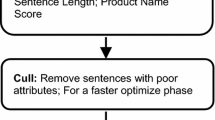Abstract
This paper presents an analysis of the rating inference task – the task of correctly predicting the rating associated to a review, in the context of movie reviews. For achieving this objective, we study the use of automatic text summaries instead of the full reviews. An extrinsic evaluation framework is proposed, where full reviews and different types of summaries (positional, generic and sentiment-based) of several compression rates (from 10% to 50%) are evaluated. We are facing a difficult task; however, the results obtained are very promising and demonstrate that summaries are appropriate for the rating inference problem, performing at least equally to the full reviews when summaries are at least 30% compression rate. Moreover, we also find out that the way the review is organised, as well as the style of writing, strongly determines the performance of the different types of summaries.
Access this chapter
Tax calculation will be finalised at checkout
Purchases are for personal use only
Preview
Unable to display preview. Download preview PDF.
Similar content being viewed by others
References
Cunningham, H., Maynard, D., Bontcheva, K., Tablan, V.: GATE: A Framework and Graphical Development Environment for Robust NLP Tools and Applications. In: Proceedings of the 40th Annual Meeting of the Association for Computational Linguistics, Philadelphia, USA (2002)
Goldberg, A.B., Zhu, X.: Seeing stars when there aren’t many stars: graph-based semi-supervised learning for sentiment categorization. In: Proceedings of the 1st Workshop on Graph Based Methods for NLP, pp. 45–52 (2006)
Li, Y., Bontcheva, K., Cunningham, H.: Adapting SVM for Data Sparseness and Imbalance: A Case Study in Information Extraction. Natural Language Engineering 15(2), 241–271 (2009)
Lloret, E.: Text Summarisation based on Human Language Technologies and its Applications. Ph.D. thesis, University of Alicante (2011)
Lloret, E., Saggion, H., Palomar, M.: Experiments on Summary-based Opinion Classification. In: Proceedings of the Workshop on Computational Approaches to Analysis and Generation of Emotion in Text, pp. 107–115 (2010)
Pang, B., Lee, L.: Seeing Stars: Exploiting Class Relationships for Sentiment Categorization with Respect to Rating Scales. In: Proceedings of the Association of Computational Linguistics, pp. 115–124 (2005)
Pang, B., Lee, L.: Opinion Mining and Sentiment Analysis. Foundations and Trends in Information Retrieval 2(1-2), 1–135 (2008)
Qu, L., Ifrim, G., Weikum, G.: The bag-of-opinions method for review rating prediction from sparse text patterns. In: Proceedings of the 23rd International Conference on Computational Linguistics, pp. 913–921 (2010)
Saggion, H., Funk, A.: Extracting Opinions and Facts for Business Intelligence. RNTI E-17, 119–146 (2009)
Saggion, H., Lloret, E., Palomar, M.: Using Text Summaries for Predicting Rating Scales. In: Proceedings of the 1st Workshop on Computational Approaches to Subjectivity and Sentiment Analysis (2010)
Spärck Jones, K.: Automatic Summarising: The State of the Art. Information Processing & Management 43(6), 1449–1481 (2007)
Author information
Authors and Affiliations
Editor information
Editors and Affiliations
Rights and permissions
Copyright information
© 2012 Springer-Verlag Berlin Heidelberg
About this paper
Cite this paper
Saggion, H., Lloret, E., Palomar, M. (2012). Can Text Summaries Help Predict Ratings? A Case Study of Movie Reviews. In: Bouma, G., Ittoo, A., Métais, E., Wortmann, H. (eds) Natural Language Processing and Information Systems. NLDB 2012. Lecture Notes in Computer Science, vol 7337. Springer, Berlin, Heidelberg. https://doi.org/10.1007/978-3-642-31178-9_33
Download citation
DOI: https://doi.org/10.1007/978-3-642-31178-9_33
Publisher Name: Springer, Berlin, Heidelberg
Print ISBN: 978-3-642-31177-2
Online ISBN: 978-3-642-31178-9
eBook Packages: Computer ScienceComputer Science (R0)





